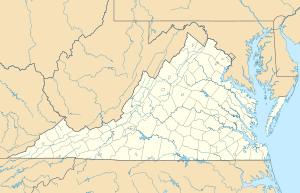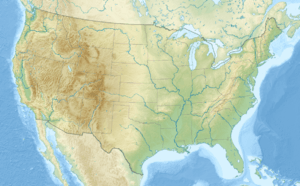Dry Creek (Hyco River tributary) facts for kids
Quick facts for kids Dry Creek |
|
|---|---|
|
Location of Dry Creek mouth
|
|
| Other name(s) | Tributary to Hyco River |
| Country | United States |
| State | Virginia |
| County | Halifax |
| Physical characteristics | |
| Main source | Little Bluewing Creek divide about 1.5 miles east-southeast of Mayo, Virginia 462 ft (141 m) 36°34′02″N 078°51′27″W / 36.56722°N 78.85750°W |
| River mouth | Hyco River about 3 miles southeast of Cluster Springs, Virginia 322 ft (98 m) 36°35′42″N 078°52′32″W / 36.59500°N 78.87556°W |
| Length | 2.59 mi (4.17 km) |
| Basin features | |
| Progression | northwest |
| River system | Roanoke River |
| Basin size | 2.91 square miles (7.5 km2) |
| Tributaries |
|
| Bridges | none |
Dry Creek is a small stream, or "creek," located in Halifax County, Virginia, in the United States. It is about 2.59 mi (4.17 km) long. This creek is a "tributary," which means it's a smaller stream that flows into a larger one. Dry Creek flows into the Hyco River.
Where Does Dry Creek Flow?
Dry Creek starts its journey about 1.5 miles (2.4 km) east-southeast of a place called Mayo, Virginia. This is where the water first begins to gather and form the creek.
From its starting point, Dry Creek flows mainly towards the northwest. It continues its path until it reaches the Hyco River. This meeting point is about 3 miles (4.8 km) southeast of Cluster Springs.
Understanding the Dry Creek Watershed
Every stream and river is part of a "watershed." A watershed is an area of land where all the water, like rain or melting snow, drains into a common point. For Dry Creek, this means all the rain that falls on its watershed eventually flows into the creek itself.
The Dry Creek watershed covers an area of about 2.91 square miles (7.5 km2). This is the total land area that contributes water to the creek. On average, this area receives about 45.8 inches (116 cm) of rain each year.
A large part of the Dry Creek watershed, about 59%, is covered by forests. These forests are important because they help keep the water clean. Trees and plants can filter out pollution and slow down the flow of water, which helps prevent floods.
 | Audre Lorde |
 | John Berry Meachum |
 | Ferdinand Lee Barnett |



